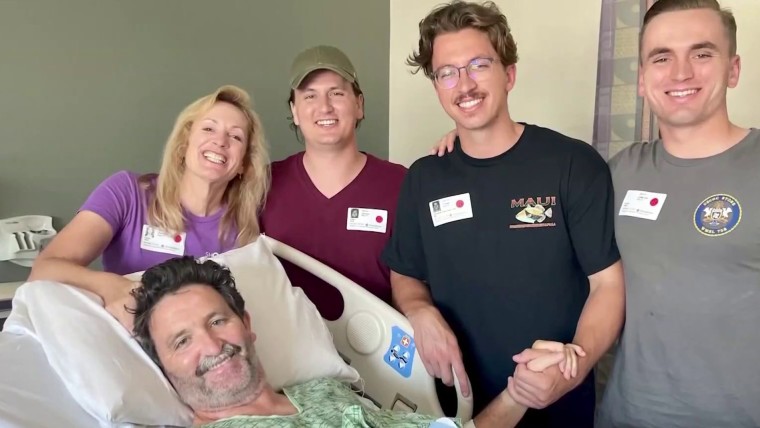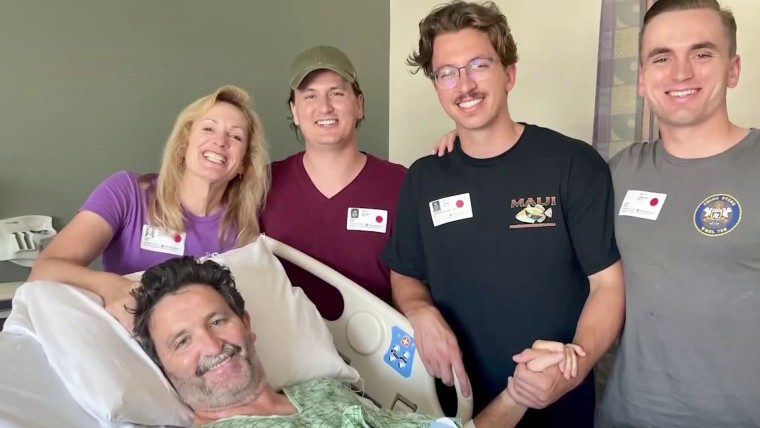What exactly is happening in the human brain when a person who has almost died is being resuscitated?
A new study of cardiac arrest survivors suggests that almost 40% of people undergoing CPR do have memories, dreamlike experiences or some type of perception even when unconscious. What’s more, brain waves show signs of activity suggesting awareness sometimes up to an hour as they are being brought back to life.
“There’s nothing more extreme than cardiac arrest because they’re literally teetering between life and death, they’re in a deep coma and they don’t respond to us physically at all,” said lead study author Dr. Sam Parnia, an associate professor in the department of medicine at NYU Langone Health. “What we’re able to show is that up to 40% of people actually have a perception of having been conscious to some extent.”
That perception can be just a vague feeling that something is happening around them. However, six patients in the study reported what the researcher called “transcendent recalled experiences of death,” or what many people think of as a near-death experience.
“They may have had a life review, they may have gone to a place that felt like home, and so on,” said Parnia, who is also the director of critical care and resuscitation research at NYU Langone.
Several patients recalled aspects of the medical treatment, such as pain, pressure or hearing doctors. Others remembered dreamlike sensations, such as being chased by the police or being caught in the rain.
Some survivors had positive memories, such as seeing a light, a tunnel or a family member, or feeling intense emotions, such as love, tranquility and peace. Others, however, had a feeling of separation from the body and a recognition that they had died or had delusions of monsters or faceless figures.
In the first-of-its-kind study published Thursday in the journal Resuscitation, Parnia and colleagues in the United States and the United Kingdom monitored 567 people who underwent cardiac arrest resuscitation at 25 different hospitals. Fewer than 10% of the patients survived since cardiac arrests are often lethal, even when doctors are standing by to do CPR. The researchers were able to interview 28 of the 53 survivors.
Eleven of them reported having memories or perceptions that suggested at least some consciousness during the resuscitation. The researchers also measured brain oxygen and electrical activity in some patients, and found gamma, delta, theta, alpha and beta waves suggesting some mental function during CPR.
“I think that’s incredible,” said Dr. Sheldon Cheskes, a professor of emergency medicine at the University of Toronto, who studies cardiac arrest resuscitation and wasn’t involved in the research. “You would never have known that without being able to do that brainwave monitoring.”
In cardiac arrest, the heart quivers with uncoordinated contractions, and the blood flow to every part of the body — including the brain — ceases.
Unlike a heart attack, in which the heart continues to beat despite a painful reduction in blood flow, a person in cardiac arrest is always unconscious. CPR is the only way to keep a person alive until the heart is shocked back into a normal rhythm with a defibrillator or an automated external defibrillator or AED. These AED devices can be used by anyone to restart the heart and are often found in public places.
The study was unique in that the researchers also tested if participants could recall specific sights or sounds, known as implicit learning. They placed headphones on the patients during resuscitation and played three words — apple, pear, banana — and also used a tablet to display 10 images.
When asked if they remembered these, only one of the 28 patients who were interviewed correctly remembered the three-word sequence and none could recall the images. The research team also analyzed the recalled memories of 126 other cardiac arrest survivors who sent their experiences by mail or were in a community database.
It’s not clear exactly what it means if someone sees a deceased family member, revisits key moments in their life or feels an overwhelming sense of love and peace, but the emotional impact is important, Cheskes said. “I personally wouldn’t read too much into those, other than these are interesting,” he said. However, the memories could have lingering psychological consequences for the survivors, he said.
It was a profound and long-lasting experience for Mary Curran Hackett of Cincinnati. Hackett, who has been involved in other research with Parnia, had a cardiac arrest and felt “a sense of complete calm and peace and kind of being enveloped by love.”
“And then when I came back — I felt the force of whatever that was come back into me. I cannot explain it other than, my whole life changed after that. I was not afraid of death,” said Hackett, an author who has written about her experiences. “I had this really deep sense that I got a clear message of why we’re here.”
The fact that two high-profile people — Buffalo Bills safety Damar Hamlin and Bronny James, son of NBA superstar LeBron James — survived cardiac arrests in just the last two years brings more attention to the need for more research into cardiac arrest survivors and the mental health impact of resuscitation, Cheskes said.
“This has sort of brought it more into the public spotlight than perhaps it has ever been before,” he said.
Historically, Hamlin and James wouldn’t have survived a cardiac arrest at all, said Dr. Lance Becker, chair of emergency medicine and a resuscitation researcher at the Northwell Health System in Manhasset, New York. “That would not have happened 10 years ago, and it would never have happened 20 years ago,” said Becker, who wasn’t involved in the research. “We’re living in a different world, and now, this study opens up a new vista and we just have to learn more about it.”
“My hat is off to Dr. Parnia because he’s trying to seriously study something that we all wonder about,” he said. “Every one of us who’s taking care of a dying patient — I’ve taken care of thousands — and you wonder, could they be conscious? Might they have a near-death experience?”
The main takeaway of this study is that survivors may have some memories of CPR, which could be a source of emotional stress for some, said Dr. Katherine Berg, an assistant professor of medicine at Harvard Medical School and chair of the writing group for the 2025 American Heart Association post-cardiac arrest care guidelines.
“I hope that studies like this one will prompt physicians to ask cardiac arrest survivors about these memories and experiences and assess for any post-traumatic stress or other psychological symptoms that might need to be addressed,” she said in an email. “I really commend the authors for this thoughtful study, which I am sure was very labor-intensive to conduct.”
It’s also a good reminder to do CPR, call 911 and use an AED if people ever witness someone having a cardiac arrest, Cheskes said. More than 356,000 people have cardiac arrests in out-of-hospital settings each year, according to the American Heart Association, which has this video on how to do hands-only CPR and use an AED and this guidance on when to start CPR.
“A lot of people see the defibrillator and they freak out — am I going to kill the patient?” he said. But a person in cardiac arrest will most certainly die, so people should definitely try to use an AED, which generally has easy-to-understand instructions, he said. “It’s hard to explain to people you can’t do something wrong.”
Cheskes said the patients in the study were not like those with “brain death” who have an irreversible loss of brain function and are therefore candidates for organ donation.
Source: | This article originally belongs to Nbcnews.com











